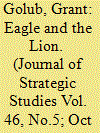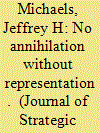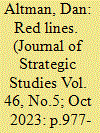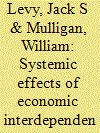| Srl | Item |
| 1 |
ID:
193178


|
|
|
|
|
| Summary/Abstract |
Andrew W. Marshall founded the discipline and the office of net assessment. As Director, Net Assessment, in the Office of the Secretary of Defense from 1973 to 2015, he developed new analytic perspectives and techniques for analyzing long-term strategic competition and understanding potential shifts in the future security environment. From 1993 to 1999, Marshall gave a series of interviews discussing net assessment – the office and the process. This article highlights three themes from those interviews – Marshall’s basic beliefs about human endeavors, his view on the nature of competition between nations, and his strategy for exerting influence in the U.S. government.
|
|
|
|
|
|
|
|
|
|
|
|
|
|
|
|
| 2 |
ID:
193173


|
|
|
|
|
| Summary/Abstract |
Many accounts of the formation of American and British grand strategy during World War II between the fall of France and the Pearl Harbor attacks stress the differences between the two sides’ strategic thinking. These accounts argue that while the Americans favored a ‘direct’ Germany-first approach to defeating the Axis powers, the British preferred the ‘indirect’ or ‘peripheral’ method. However, a review of Anglo-American strategic planning in this period shows that before official U.S. wartime entry, both sides largely agreed the British ‘peripheral’ approach was the wisest grand strategy for winning the war.
|
|
|
|
|
|
|
|
|
|
|
|
|
|
|
|
| 3 |
ID:
193176


|
|
|
|
|
| Summary/Abstract |
Scholars focused on NATO nuclear strategy during the Cold War have devoted little attention to the dynamics of how the Alliance would decide to use nuclear weapons. This article aims to fill this gap by examining the internal debates about how a nuclear use decision would be taken, particularly balancing the desire to ensure adequate consultation of the non-nuclear members without undermining the credibility of NATO’s nuclear deterrent by giving them a veto. To avoid undermining Alliance cohesion, the nuclear use decision process was kept deliberately vague, despite the problems that would almost certainly have arisen in a war.
|
|
|
|
|
|
|
|
|
|
|
|
|
|
|
|
| 4 |
ID:
193175


|
|
|
|
|
| Summary/Abstract |
Using declassified materials to examine the eleven red lines of the Cuban Missile Crisis, this study qualifies and amends two popular beliefs about them: failing to punish violations damages credibility and deterrence requires declaring unambiguous red lines. I argue, first, that violations of red lines create fleeting ‘windows of credibility’ wherein violators fear retaliation. If declarers move quickly, they can convert non-enforcement into a bargaining chip, exchanging it for concessions while avoiding escalation. Second, rather than wholly embrace clarity or ambiguity, declarers frequently optimize by combining clear demands with ambiguity about the consequences of crossing those lines.
|
|
|
|
|
|
|
|
|
|
|
|
|
|
|
|
| 5 |
ID:
193172


|
|
|
|
|
| Summary/Abstract |
Empirical research generally supports the dyadic-level trade-promotes-peace hypothesis, while demonstrating that the relationship is weaker, more complex, and more conditional than liberal theory suggests. We shift to the system level and examine a neglected path to conflict in economically interdependent systems. In the great power competition for support among smaller states, a great power at a competitive disadvantage in economic instruments of influence may be incentivised to adopt more militarised strategies. We illustrate our argument with case studies of Austro-Hungarian and Russian influence strategies before the First World War and of Prussian strategies among German states before the Franco-Prussian War.
|
|
|
|
|
|
|
|
|
|
|
|
|
|
|
|
| 6 |
ID:
193177


|
|
|
|
|
| Summary/Abstract |
During the Cold War, the United States and the Soviet Union implemented multiple arms control treaties that depended on National Technical Means (NTM) for verification. Since NTM included covert satellite reconnaissance systems that gathered a sizeable portion of American intelligence on the USSR, the US government kept the details about its NTM ambiguous. Consequently, US diplomats had to negotiate a verification framework dependant on NTM without compromising sensitive space-based intelligence capabilities. This article uses newly declassified documents to explore how Washington and Moscow navigated the boundaries of secrecy concerning space reconnaissance to create a robust arms control verification regime.
|
|
|
|
|
|
|
|
|
|
|
|
|
|
|
|
| 7 |
ID:
193174


|
|
|
|
|
| Summary/Abstract |
integrated into the broader Allied war effort and contributed to the collapse of the Japanese wartime economy. From 1940 to 1945, the Sino-Japanese conflict on the Yangtze, while influenced by developments in other theatres, remained at the core of Kuomintang’s concerns and strategy. The fall of Yichang caused severe economic and strategic difficulties in Free China. Assisted by the US, the Chinese forces repelled the Japanese expansion in West Hubei. Moreover, the Sino-US aerial interdictions on the Yangtze halted iron ore shipment essential to the Japanese economy.
|
|
|
|
|
|
|
|
|
|
|
|
|
|
|
|